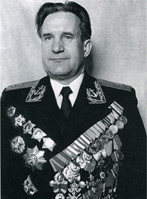
Birthday anniversary of George N. Kholostyakov, Soviet naval commander, Hero of the Soviet Union
July 20 (August 2) 1902, in Baranovichi, Minsk Province, in the family of a railway engineer was born a distinguished Soviet naval commander, Hero of the Soviet Union, George Nikitich Kholostyakov.
From August 1919, he participated in the Civil War. He fought on the Western Front in the special forces (CHON) and then served political director of a rifle company. In 1920, in a battle with the White Poles, Kholostyakov was wounded and taken prisoner, but was released in early 1921.
In December 1921, as a volunteer for the Young Communist League, Kholostyakov set off to join the Worker-Peasant Red Navy. Soon, he graduated from the Naval Preparatory School, and then served as deputy political commissar of a company of the 2nd Baltic Naval crew. In 1925, after graduating from the Naval Hydrographic School Kholostyakov became chief of the watch on the battleship "Marat", and in December 1925 was a navigator of the submarine "Kommunar".
In 1928 he graduated from the submarine classes of special courses for commanders of the Navy, and in November of the same year he was appointed executive officer of the submarine “Proletariy”, then served in the same positions on submarines "Batrak" (from May 1929), “L-55” (from January 1930). In 1931, George became commander and commissar of submarine "Bolshevik".
In 1932, Kholostyakov graduated from tactical courses at the Naval Academy and was assigned to the Pacific Fleet as the commander of a submarine division, then he became commander of the 5th Brigade of submarines. George proved himself a talented innovator in the combat training of submarine forces, pioneered the development of ice sailing in the fleet and the performance of combat training missions in heavy weather, and initiated a number of long trips in the open ocean.
May 7, 1938 2nd rank captain Kholostyakov was arrested after being denounced and accused of having links with the arrested "enemies of the people", of spying for Poland, the UK and Japan and of sabotage. According to the verdict of the military tribunal of the Pacific Fleet of 17 August 1939, he was convicted under Article 58-7 (sabotage) and sentenced to 15 years in labor camps with subsequent disqualification for 5 years, stripped of his military rank and awards. Kholostyakov served his sentence in Olga Bay of the Pacific Ocean. Only through the intervention of M. I. Kalinin, the case was reviewed and dismissed for "failure to prove the charges."
From September 1940 Kholostyakov served as commander of the 3rd Brigade of the Black Sea Fleet submarines, and from February 1941 he headed the department of diving of the Black Sea Fleet.
During World War II, from July 1941, 1st rank captain Kholostyakov was the chief of staff, and from September 1941 - the commander of the Novorossiisk naval base. He participated in securing the Kerch-Feodosiya operation, organization of supplies by sea for Soviet forces in Sevastopol, prepared the defense of Novorossiysk from land. During the breaking of German-Romanian forces to Novorossiysk in August 1942, Kholostyakov was appointed commander of the Novorossiysk defense area, so that all sea and land forces were subordinate to him. After the fall of Novorossiysk, the naval base was not disbanded, but in full force evacuated to Gelendzhik and from there continued its military activities. It was Kholostyakov who had planned landings at Yuzhnaya Ozereyka in February 1943, in the port of Novorossiysk in September 1943, and at Eltigen in October 1943.
In December 1942, Kholostyakov was awarded the title of "Rear Admiral."
Along with the previous post in December 1943 - March 1944, Kholostyakov commanded the Azov Flotilla. At that time he prepared and conducted two landing operations (to the Cape Tarkhan in January 1944 and to the port of Kerch in February 1944), but both were unsuccessful and resulted in heavy losses. From December 1944 until the end of the war George Nikitich was a commander of the Danube Flotilla, widely known under his command during the liberation of Yugoslavia, Hungary, Austria, Czechoslovakia.
In May 1945, Kholostyakov was awarded the title of "Vice-Admiral."
In 1950, Kholostyakov graduated with a gold medal from the Academy of the General Staff; in 1950-1951 he commanded the Caspian Flotilla; and from November 1951 - the 7th Fleet in the Pacific. In May 1953, Vice Admiral Kholostyakov served as deputy chief of the combat training of the General Staff of the Navy. In April - May 1964, as a senior on board of the nuclear submarine, "K-27", he participated in one of the first long-distance ocean trips by Soviet submariners.
Under the decree of the Presidium of the Supreme Soviet of May 7, 1965 for the courage and heroism during the Great Patriotic War, Vice Admiral George Kholostyakov was named a Hero of the Soviet Union and awarded the Order of Lenin and the "Gold Star» medal (№ 10689).
In 1969, Vice-Admiral G. N. Kholostyakov retired, but was actively involved in the military-patriotic work and wrote two books of memoirs: "Eternal Flame" and "The attacks from the sea."
The life of the honored naval commander ended tragically July 19, 1983, when he was killed along with his wife in a robbery of their apartment. George Kholostyakov was buried at Kuntsevo Cemetery in Moscow
Lit.: Герои Советского Союза: Краткий биографический словарь. Т. 2. М., 1988; Доценко В. Д. Морской биографический словарь. СПб, 1995; Лурье В. М. Адмиралы и генералы Военно-Морского Флота СССР. СПб, 2001; Холостяков Г. Н. Атаки с моря. М., 1980; Он же. Вечный огонь. М., 1976; То же [Электронный ресурс]. URL: http://militera.lib.ru/memo/russian/holostyakov_gn/index.html
Based on the Presidential Library’s materials:

